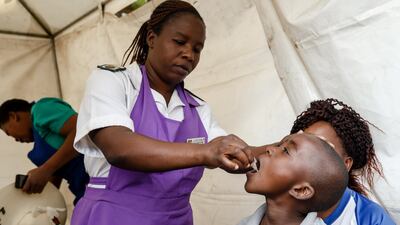The world’s forgotten children will be issued with “digital birth certificates” under plans to ensure they do not miss out on life-saving vaccinations.
At the end of its conference in Abu Dhabi, Gavi, which has helped to vaccinate about 700 million children in the past two decades, announced a deal with Mastercard in which the company will use its technology to give parents cards programmed with their children’s health data.
About 80 per cent of the world’s children receive at least one vaccination but millions remain unprotected.
There is concern that the children who are most vulnerable often do not have formal identity papers or may be from families hiding from the authorities, making it almost impossible for health workers to know whether they have been immunised or when booster shots are due.
There are also record numbers of refugees, which has hampered efforts to identify children in vulnerable situations. The card is one of many new technologies being used to increase the number of children vaccinated.
Others include deliveries by drone, solar-powered fridges that can be used to preserve shots on trips into isolated areas and the use of biometric data such as face scans to obtain a child’s health records.
Michael Froman, vice chairman and president of Mastercard, said the programme could also help governments by providing data on how successful their vaccination programmes were.
“We’re very proud to be working with Gavi to help increase the efficiency and effectiveness of delivery of vaccines,” Mr Froman said. “Right now, a lot of this is done in paper form – it’s quite manual. We’ll be able to give a unique digital identifier to a child when he or she is born – the equivalent of a birth certificate – for that parent to be able to have an electronic record of what vaccines a child has received and to get a reminder of when they’re overdue to get a vaccine.
"It will also give, very importantly, the government greater insight into how a vaccine programme is working and where there are gaps.
“We see this as very much part of digitising the lives of people at the base of the pyramid and putting them on a map to greater prosperity.”
The programme is set to be introduced across five countries over the next two years, with the goal of expanding it after that.
Gavi, which works with the private sector and has had great success in driving down the costs of vaccinations in poor countries, said its work has saved 10 million lives since it was set up in 2000.
______________
Read more:
UAE Gavi vaccine summit: The fight against tropical diseases that blight the poor
Abu Dhabi summit to be told of threat posed by anti-vaccine conspiracy theories
Governments have a 'moral duty' to tackle preventable diseases
______________
It acknowledged that it had reached the "easy targets" and was now focusing on extending help to the minority of children who still go without vaccinations, and who are likely to be in conflict zones or isolated, underdeveloped areas.
Seth Berkley, the Gavi chief executive, said in his closing remarks that the organisation would also have to be ready to deliver “blockbuster” vaccinations for diseases such as HIV and malaria, which are under development.
“We have two HIV vaccines in phase 3 clinical trials right now,” Mr Berkley said.“We have a malaria vaccine that is going into a phase 4 trial to see if it can be implemented now in Africa, and we have a tuberculosis vaccine that recently showed very promising results and will go to efficacy testing.
“If we have these vaccines we need a strong system that will be able to deliver them and there are other high incidence pathogens that the research and development industry is working on.”

